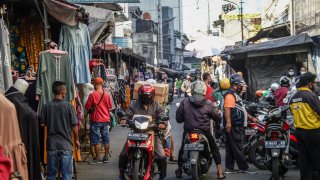
- Asia is seeing weakness in retail sales as sporadic Covid outbreaks continue in multiple countries.
- Lloyd Chan of Oxford Economics said the "bumpy and rather uneven" recovery in consumer spending was largely attributable to the ongoing pandemic.
- Compared to developed countries in the West, most Asian nations have been slow in inoculating their populations largely due to reasons such as a lack of excess to vaccinations.
As consumer spending in China continues to lag in its economic recovery from the pandemic, a similar weakness in retail sales is being witnessed elsewhere in Asia.
"For most parts of Asia, we're still seeing private consumption recovering but it is slow and it remains below the pre-pandemic levels," said Lloyd Chan, senior economist at Oxford Economics.
Chan said the "bumpy and rather uneven" recovery in consumer spending in the region can be largely attributed to the ongoing pandemic, as sporadic outbreaks continue in multiple Asian countries.
Get New England news, weather forecasts and entertainment stories to your inbox. Sign up for NECN newsletters.
China, often referred to as the "first in, first out" of the Covid crisis, has been largely successful in keeping resurgent waves of the coronavirus at bay. Still, the country's economic recovery has been held back by sluggish retail spending despite government efforts to boost spending.
Meanwhile, waves of resurgence elsewhere in Asia likely had a negative impact on consumer sentiment as well as mobility, said Taimur Baig, chief economist at Singapore's DBS Bank.
"As we've seen in the last year, mobility is a very strong prerequisite toward consumption because sitting at home, you order a lot of things through the e-commerce route — but you still don't spend the kind of money that you would if you were able to go out on a regular basis," Baig said.
Money Report
In North Asia, the Japanese prefecture of Okinawa is still under a state of emergency while other areas — including Tokyo — are under priority preventative measures, information from the Ministry of Health, Labour and Welfare showed.
Meanwhile in Southeast Asia, Indonesia's health minister said in June that parts of the country are running out of hospital beds as cases associated with the delta variant of Covid surge.
India, which has the second highest number of Covid cases in the world, saw its total caseload top 30 million in late June. Until recently, the South Asian nation country has been grappling with a devastating second wave as cases spiked, overwhelming the health-care system.
Asian governments have extended less fiscal and monetary support as compared to their Western counterparts — and that will likely further weigh on the region's economic recovery, Baig added.
"As long as mobility restrictions are there, as long as policy support remains relatively softer, we will see a very sluggish recovery in consumption," the DBS economist said.
Asia's slow vaccination rollout
Compared to developed countries in the West, most Asian nations have been slow in inoculating their populations largely due to reasons such as a lack of excess to vaccinations.
Oxford Economics' Chan said the firm placed "quite a large weight" on Covid vaccinations as the solution for a return of private consumption in Asia.
However, Baig was not so optimistic, and pointed out that most of Asia is "so down the ladder in terms of rates of vaccination that doubling or tripling that rate is not gonna change anything meaningfully."
"You don't necessarily see a pick up in consumption around low rates of vaccination improvement, it needs to reach a critical mass and most countries in Asia are many, many months away from reaching a critical mass," said the DBS economist.
As of July 1, only 12.65% of Japan's population has been fully vaccinated against Covid-19, according to Our World in Data.
In Southeast Asia, countries such as Indonesia and the Philippines have both fully vaccinated only 5% or less of their population. Singapore is among the outliers regionally, having fully inoculated nearly 37% of its population as of July 4.
In contrast, both the U.S. and U.K. have already fully vaccinated more than 40% of their population.






